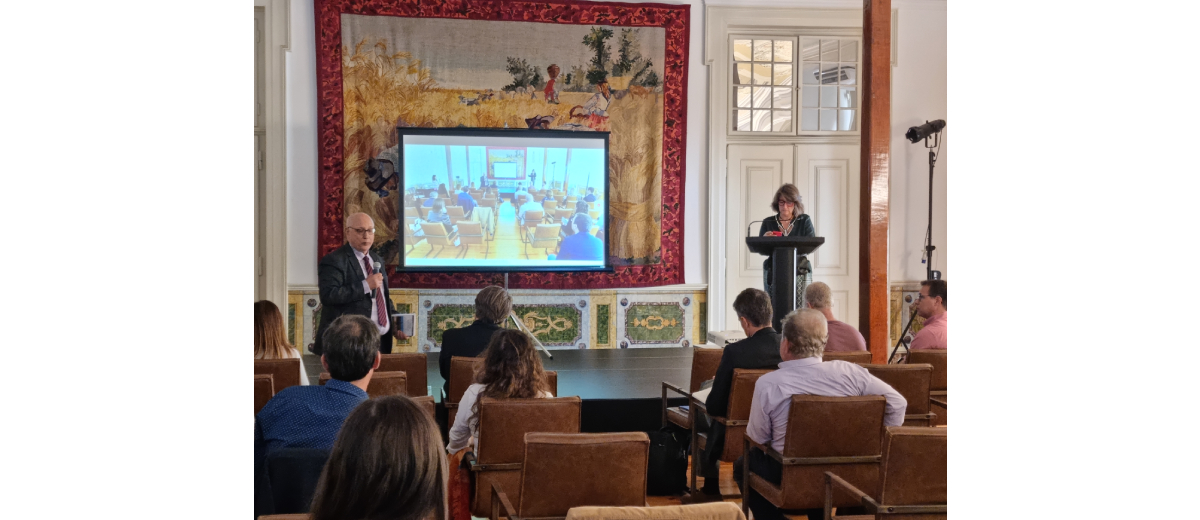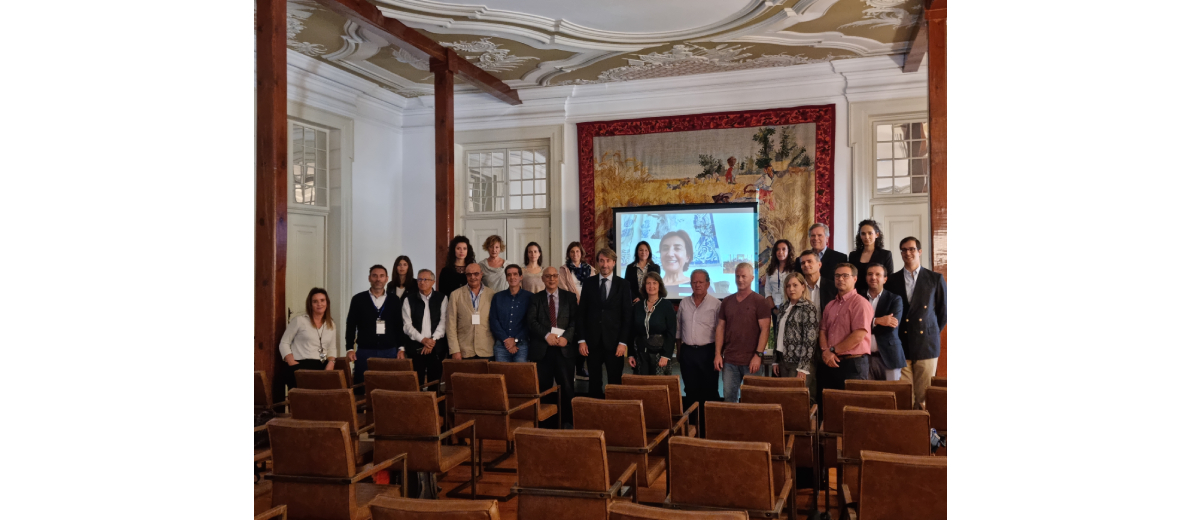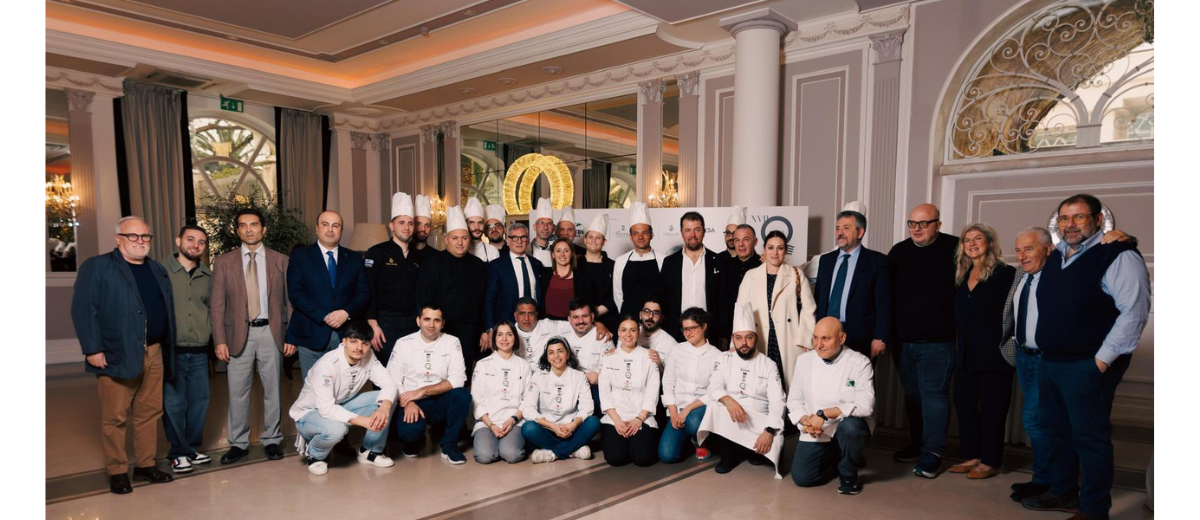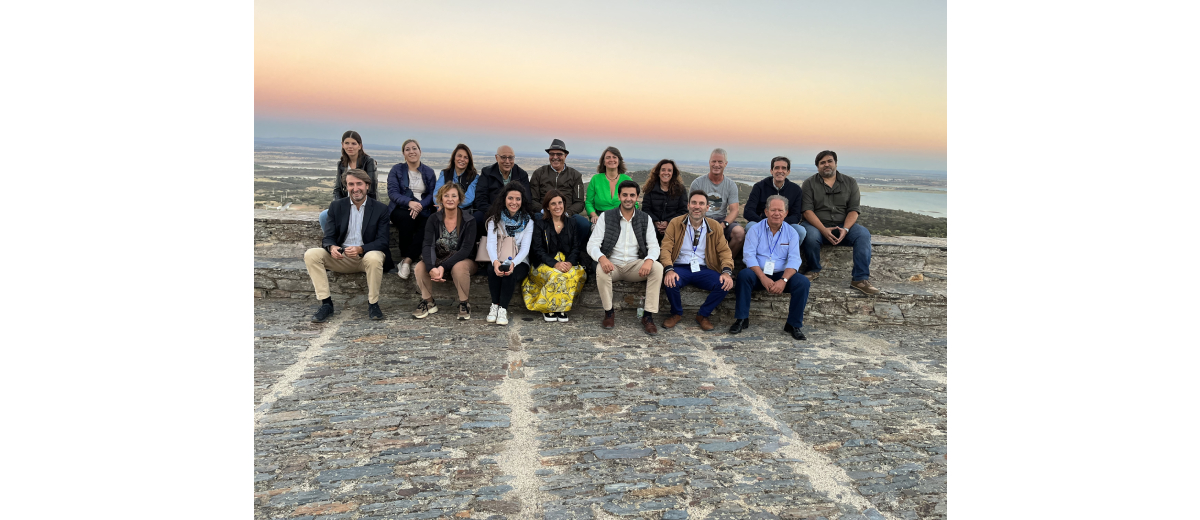
The IOC gathers experts from around the world to discuss Initiatives to increase the resilience of the olive sector
Lisbon/Évora, Portugal, 27-30 September 2022
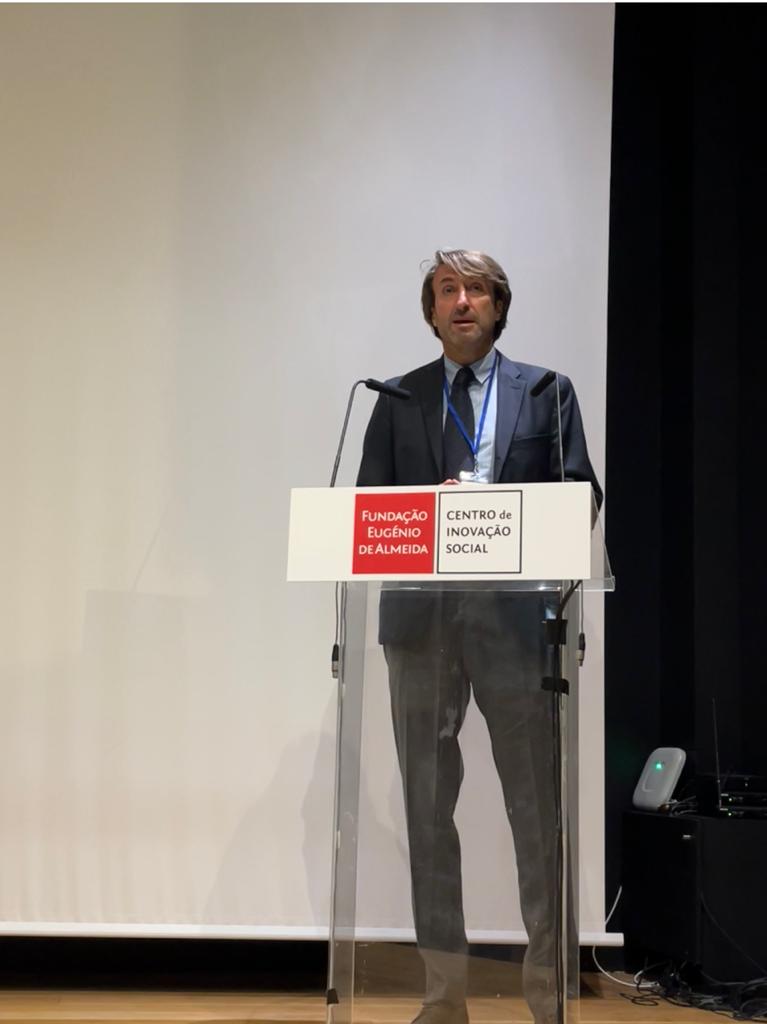
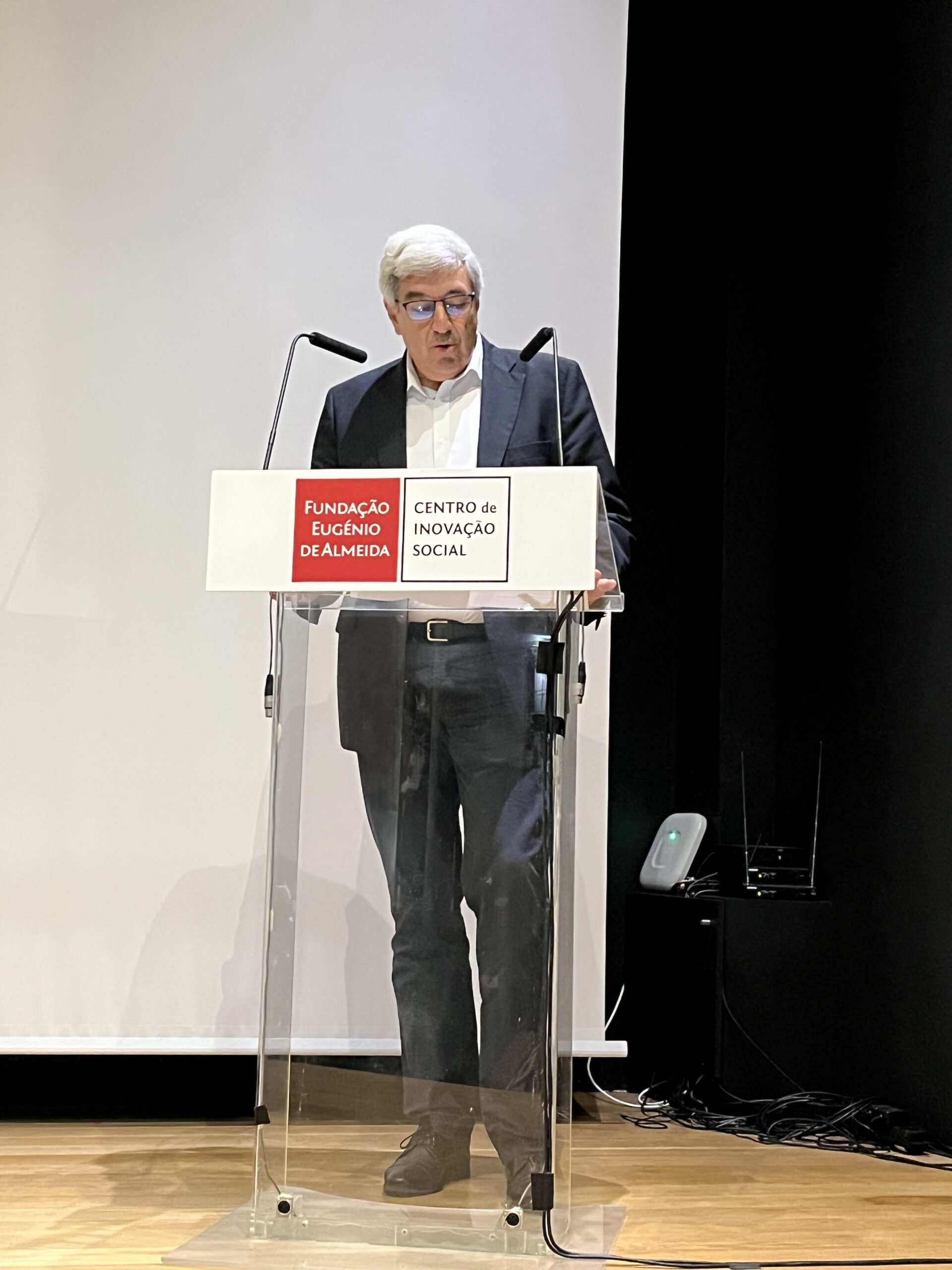
From 27 to 30 September 2022, the IOC held an international workshop on initiatives to increase the resilience of the olive sector in Lisbon/Évora, Portugal. The Regional Director of Agriculture from Alentejo Region, José Godinho, participated in the opening of the event, and the Portuguese Minister of Agriculture and Food, Maria do Céu Antunes, in the close. Both were hosted by the Deputy Executive Director of the IOC, Jaime Lillo.
This workshop gave an overview of several topics related to the sustainability of the olive oil and table olive value chain, opening minds to new “sustainable thinking”.
It gathered the coordinators of the main projects on the sustainability and resilience of olive production systems that are currently underway to:
- Acknowledge the progress, methodologies and results of the different projects;
- Provide opportunities for stakeholders to network and share experiences;
- Create new consortia, with the support of the IOC, to develop new research projects and research and development strategies; and
- Coordinate and follow up on olive resilience and sustainability.
Also from the IOC, the Head of the Olive Growing, Olive Oil Technology and Environment Unit, Lhassane Sikaoui, and the Head of the Technical Cooperation and Training Department, Catarina Bairrao Balula, also attended to facilitate the workshop.
Lhassane Sikaoui introduced the workshop and passed the floor to the other speakers.
The first part of the workshop focused on the conservation of the genetic resources of the olive tree and research into varieties that are resistant to different biotic and abiotic stresses. First, ‘The IOC olive germplasm network as solid work tool to face climate change’ was introduced.
Monji Msallem, from the Institut de l’Olivier (Tunisia), then gave a lecture on ‘The exploitation of olive genetic diversity: A way to increase the sector’s resilience to climate change’.
‘Olive Reference Collection of Portugal: valorization of autochthonous diversity’ was given by Carla Inês and António Cordeiro, from the National Institute for Agrarian and Veterinarian Research (Portugal).
From the CNR (Italy), Luciana Baldoni introduced the BeFOre – Bioresources for Oliviculture project.
Hristofor Miho, from the University of Córdoba, UCOLIVO group (Spain), introduced ‘GEN4OLIVE project: Bringing olive genetic resources closer to breeders and growers’.
The projects ‘Freeclimb, Fruit Crops Resilience to Climate Change in the Mediterranean Basin’ and ‘BreedOLea: Creating new olive varieties to adapt to climate change and improve product quality’ were introduced by Georgios Koubouris, from ELGO-DIMITRA, Chania (Greece).
The ‘ClimOliveMed project’ was introduced by Bouchaib Khadari. CIRAD, France ONLINE
‘BeXyl, a new research and innovation action from Horizon Europe to fight against Xylella fastidiosa worldwide’ was introduced by Blanca Landa from IAS, CSIC, Spain. She also gave a lecture on ‘Deciphering, modelling and culturing the xylem core microbiome to enhance resilience of olive trees to vascular diseases’.
José Alberto Pereira, from the Instituto Politécnico de Bragança, Portugal, introduced ‘OLIVECOA – Centenarian olive trees of Côa Valley Park: rediscovering the past to valorise the future’ and ‘OleaPrime – Survey and characterization of centenarian olive trees for its preservation and valorization’.
The second part of the workshop was on olive growing in the face of climatic changes: chilling requirements, drought, etc.
‘Olive Resilience to Climate Change in the Mediterranean Basin’ was introduced by Georgios Koubouris, ELGO-DIMITRA, Chania, Greece.
Kostas Chartzoulakis, ex-Director of the Institute for Olive Tree & Subtropical Plants, Crete, Greece, gave a lecture on ‘Desertification risk assessment in olive growing areas under different cultural practices in west Crete, Greece’.
‘Sustainability of the olive tree and arboriculture in semi-arid and arid Tunisia’ was introduced by Mouna Aïachi Mezghani, Institut de l’Olivier, Tunisia
Giora Ben-Ari, from the Agriculture Research Organisation, Volcani Institute, Israel, introduced ‘The effect of high temperatures on olive productivity’.
‘Water use responses to experimental warming in young olive trees’ was introduced by Cecilia Rousseaux, CRILAR-CONICET, Anillaco, La Rioja, Argentina.
The third part was on sustainable olive farming and conservation of biodiversity in olive groves.
Abderraouf EL-Antari, INRA Morocco, gave a lecture on the ‘Contribution of the olive growing areas in Morocco in the preservation of biodiversity and their role in the resilience of the olive tree’.
‘High technology for sustainable authoctonous olive cultivation and innovations in traditional food value chain’ was introduced by Marija Markoč, CEO of Barska uljara Ltd., Montenegro.
Jose Alfonso Gomez Calero, from the IAS, CSIC, Spain presented ‘Soil management to optimize soil and water use under changing climate conditions’.
Paula Garcia Fraile, from the University of Salamanca, Spain, gave a lecture on ‘Developing new bacterial consortia and mycorrhizal inoculants to promote climate-resilient and stress-tolerant plants’.
‘BIOVEXO – Biocontrol of Xylella and its vector in olive trees for integrated pest management’ was introduced by Ana Falcón.
‘Climate change and automation of irrigation in olive growing’ was the lecture given by Maja Podgornik, from the Science and Research Centre Koper, Slovenia.
José Alberto Pereira from the Instituto Politécnico de Bragança, Portugal, introduced ‘NOVATERRA: Integrated novel strategies for reducing the use and impact of pesticides. Towards sustainable Mediterranean vineyards and olive groves’; and ‘Man4Health – New management strategies in olive groves for improving soil health and crop yield’.
‘Intercropping in olive orchards’ was introduced by Ayça Akça Uçkun, Olive Research Institute, Izmir, Turkey.
Roberto García Ruiz, from the University of Jaén, Spain, introduced the ‘Sustainability of the olive groves: lessons learnt from SUSTAINOLIVE (PRIMA-H2020)’.
José Alfonso Gómez Calero, IAS, CSIC, Spain, presented ‘BIOLIVAR, Monitoring, optimisation and valorisation of natural capital in olive growing under integrated production in Andalusia’.
The BIOMEnext project, ‘Modelling integrated biodiversity-based next generation Mediterranean farming systems’, was introduced by Luciana Baldoni, CNR, Italy.
Isabel Ribeiro from NUTRIFARMS and Ana Dahlin from Capital Natural, Portugal, gave a lecture on ‘Ecological sustainability – NUTRIFARMS Management Plan for Natural Values’.
Carlos Ruiz, SEO, Spain, introduced the ‘OLIVARES VIVOS’ and ‘OLIVARES VIVOS PLUS’ projects.
The fourth part was on promoting olive by-products.
Sebastián Sánchez, from the Institute of Research in Olive Grove and Olive Oils, University of Jaen, Spain, introduced ‘Technological alternatives for the use of by-products and waste from olive groves and oil mill’.
‘Composting olive pomace and its application in the olive grove’ was presented by Belén Fernández, IRTA, Tarragona, Spain.
‘Treatment and reuse of oil mill wastewater’ was introduced by Gassan Hodaifa, from the University of Pablo de Olavides, Area of Chemical Engineering, Seville, Spain.
The fourth part was on olive farm economics.
‘Olive orchards sustainability in Portugal’ was introduced by Francisco Campello, AGRO.GES, Portugal.
Gonçalo Moreira, from OLIVUM, Portugal presented ‘Alentejo Olive Oil Sustainability Program (PSAA)’.
Giora Ben-Ari, Agriculture Research Organisation, Volcani Institute, Israel, presented ‘ARTOLIO– Supporting small olive oil producers across the Mediterranean’.
The last part was on donors.
Catarina Bairrao Balula, the Head of the Technology and Training Department, IOC, introduced ‘The IOC as knowledge hub, booster of international projects and research’.
Pierre Bascou, European Commission, DG Agriculture, Director Sustainability (AGRI.B), gave a lecture on the ‘EU public support available for improving the resilience of olive producers in the EU’.
After the lectures, a discussion took place on future research and collaborative projects.
This workshop was an opportunity for guests to discuss sustainability in olive orchards and the need to spread awareness. It was agreed that the importance of the olive sector as a carbon sink should also be disseminated and studied in more detail.
Projects likes these, which focus on the end user, use quantitative data at all stages, and are centred not only on the survival of olive trees in the face of climate change but also on production, both in terms of quantity and quality, are critical to the sector.
Speakers emphasised the need to share results, through field guidance, teaching new generations about new technologies and techniques, and improving farm management to help business.
The workshop also shone the spotlight on the IOC as a hub for knowledge, a promoter of international projects and research and a networker among sector stakeholders, the scientific community and decision makers, striving to make the olive sector more resilient.
